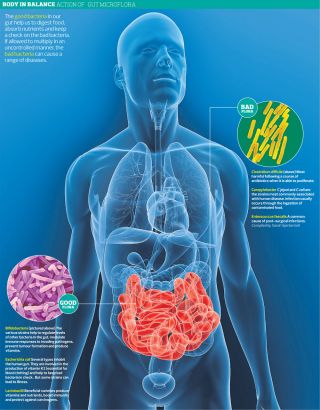Anxiety
Gut Bacteria Transplant: A New Treatment For Anxiety?
Gut bacteria transplantation holds promise in treating obesity and anxiety.
Posted September 24, 2013
Recent scientific studies indicate that gut bacteria may play a pivotal role in brain chemistry and mental health. More specifically, the right type of “healthy bacteria” in your gut may treat/prevent depression and anxiety.
In research circles the gut is often referred to as the "second brain". There are over 100 million neurons in the gut (more than the spinal cord or peripheral nervous system) and many contain the exact same neurotransmitters as the brain.

We know that the gut and mood are related—think butterflies in your stomach when anxious or a knot in your stomach when stressed out. This link is via the vagus nerve, a direct neuronal connection between the gut and the brain. In fact vagus nerve stimulation via an implanted electrode treats depression.
What’s new and exciting now are studies that indicate that bacteria in the gut are doing far more than simply digesting food and maintaining a healthy immune system.
Here is some background on recent findings related to gut bacteria:
Don't be put off by the term "bacteria" like it's a bad thing. Actually, there are over 100 trillion microorganisms living in the gut—vastly more than the number of cells in your whole body. These bugs weigh about five pounds, the same as your brain and perform a multitude of functions, much like other organs in the body.
Transplantation of good, healthy bacteria from one person’s gut to another is quick and inexpensive via endoscopy, colonoscopy or enema. This is essentially a “stool transplant”, but is more accurately known as fecal microbiota transplantation (FMT). FMT is currently used to treat life threatening infections, has a 90% cure rate and is being studied as a possible treatment for inflammatory bowel disease. Could weight loss be next?

A fascinating study looked at identical human twins, where one was thin and the other obese. Their gut microbiota was transferred into specially bred mice who did not have their own gut bacteria. Remarkably, the mice who received bacteria from thin subjects stayed thin, while the recipients from the obese twins became fat.
As for the psychiatric possibilities, there was a recent study of calm vs. anxious mice. Fecal microbiota transplanted from an anxious strain of mice made a calm mouse very anxious. Not only that, but transplant of the gut content from the calm strain helped to relax and increase the confidence of the anxious strain . In this case, their behavior wasn't dependent on genetics or brain chemistry but rather the bacterial composition of their gut!
In humans, UCLA looked at 36 women without psychiatric symptoms. Twelve women ate fermented yogurt with probiotics (so called “good bacteria”), 11 ate a non-fermented milk product and 13 received no intervention whatsoever. By measuring brain activity via functional MRI, they found the women who ate the fermented yogurt registered brain function changes in areas associated with emotion and sensation when exposed to pictures showing angry or frightened faces.
This is the first human study to show an interaction between probiotics and the brain. Larger and more complex studies are in the works, but the National Institute of Mental Health has called for grant submissions to further investigate this potentially game changing concept.

Humans are, by cell count, approximately 90% bacteria. As microbial research continues, we're finding these little bugs play a much bigger role in our life than we could ever imagine. Our mental and physical health may well not just be encoded in our DNA but dictated by our bacterial makeup as well.
The next treatment for depression or anxiety may well focus on the bacterial composition of our gut as opposed to brain chemistry. Stay tuned.


